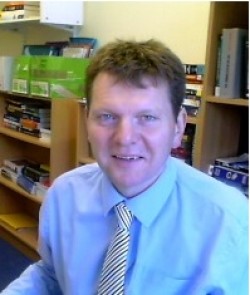Dr Cobb’s passion for electronic technology has been a consistent theme throughout his professional career, encompassing such diverse fields as biomedical engineering, and artificial intelligence. “I was fortunate to commence by professional life at the same time as the microelectronics revolution started and was immediately enthralled by the possibilities of the silicon chip”. This led to a position in a microelectronics design centre followed by a scholarship to study for a Masters in Microelectronics at the University of Southampton. “At that time Digital Signal Processing (DSP) was an emerging field offering great potential and I developed microcontroller and FPGA based DSP solutions. “
Cobb then commenced a part-time doctorate and worked with medical physicists at Poole and Salisbury hospitals investigating application of new technologies in diabetes and stroke. “The PhD work was a fantastic experience that absorbed my thoughts for many years, achieving a novel solution and especially one designed to help patients was very fulfilling.” Having completed the PhD and achieving Chartered Engineer status, Cobb chose to remain in academia. “I secured a prestigious EPSRC grant to further develop a blood flow sensor.” This work provided a basis for a series of related PhD investigations supervised by Cobb. “Supervising research students brings great satisfaction, inspiring others with your own hard won knowledge and skills; sharing insight into the scientific method and satisfying the desire for challenge and progress.”
Recently, Cobb has diversified into a broad range of application areas “Many of the challenges of the underlying technology have been resolved and the challenge is now more in the application domain. I have projects that use similar instrumentation to provide solutions in stroke rehabilitation, swimming performance analysis and computer games interfaces. Such a multi-disciplinary approach brings new insight, opportunities and motivation.”
Research
I am currently supervising four doctoral students, two of whom are working with the Medical Physics department at Salisbury Hospital, one with Naim Audio and the fourth is based in the Sports Science department at Bournemouth University.
The collaborative work with Professor Swain at Salisbury District hospital involves application of newer technologies, such as, integrated accelerometers and wireless sensor networks to provide assistive rehabilitation based on functional electrical stimulation for stroke patients. These projects are funded via matched funding between Odstock Medical Limited and Bournemouth University. We are also investigating through collaboration with BU Sports Scientists how these technologies can be applied for performance assessment in athletes, in particular, swimmers. Our collaborative work with Naim Audio is investigating novel low noise approaches to providing electrical power to high specification audio power amplifiers.
I am very happy to discuss potential research collaboration with academics or industry.
Publications
Journal articles
Chapters
Conferences
Grants
Grants
This page is a shortened version of a BU academic profile. To view the complete profile, visit our Staff Profiles site.
